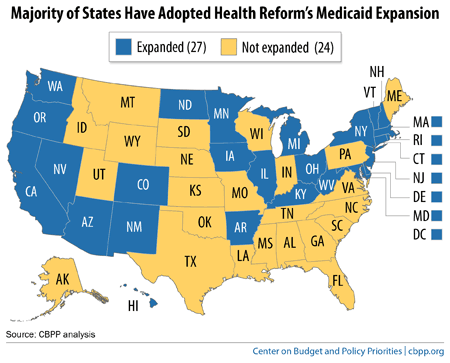BEYOND THE NUMBERS
As a growing number of reports increasingly make clear, a state’s decision whether to expand Medicaid as part of health reform has real-life effects on its residents and its businesses. In the 26 states and the District of Columbia that have expanded Medicaid (see map), the positive benefits are already playing out. Here’s some of the latest information:
- Hospitals are providing less uncompensated care. In Arizona, hospitals reported that the Medicaid expansion is the chief reason for a 30 percent decline in the amount of uncompensated care they have provided so far this year, compared with a year ago. The Colorado Hospital Association found a similar decline in charity care through April when it surveyed hospitals in 15 states that have expanded Medicaid and 15 that have not.
- Medicaid expansion is driving large gains in health coverage. A survey conducted by the Urban Institute finds that while the uninsurance rate is dropping across the country, states that have expanded Medicaid have seen a drop in the percentage of non-elderly adults who are uninsured by more than one-third — a 37.7 decline — while the uninsured rate fell by only 9 percent among states that haven’t expanded. A survey from the Commonwealth Fund found a similar trend.
States can opt in to the Medicaid expansion at any time, allowing them to extend coverage to millions with the federal government picking up all of the cost of the expansion through 2016 (and nearly all of the cost in the years after), as we have written. New Hampshire recently started accepting applications for its expansion, with coverage first available on August 15.

But states that refuse to expand leave a coverage gap, where people below the federal poverty line have income too high for Medicaid under prior eligibility rules but too low to qualify for federal subsidies to purchase coverage through the marketplaces. This means we’re likely to see more stories as in Tennessee where, due to the coverage gap, a couple separated so the wife’s income would be low enough to maintain her Medicaid coverage.
